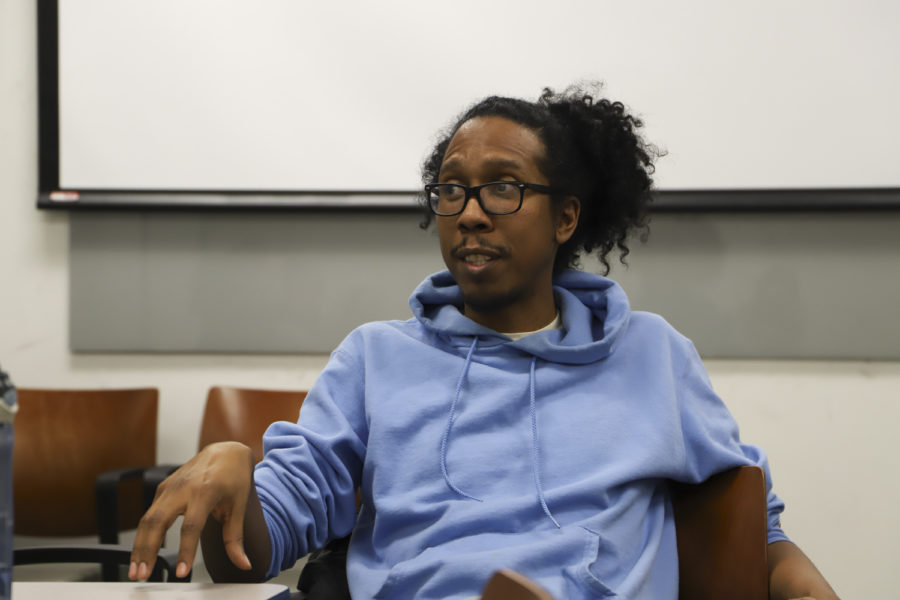Pitt Unmuted talks sexual violence
Sarah Cutshall | Visual Editor
Planned Parenthood of Western Pennsylvania Violence Prevention Program Manager Jose Garth spoke with Pitt Unmuted Tuesday night about toxic masculinity and gender issues.
February 27, 2019
Pitt Unmuted, a student group that helps facilitate environments where survivors of sexual assault can share their stories, began in 2017 with a focus on collecting written and visual submissions from its members. But the group also looks for ways to actively prevent sexual violence.
Its guest speaker Tuesday evening was Jose Garth of Planned Parenthood of Western Pennsylvania, who spoke on sexual violence prevention strategies to a small group in a Cathedral of Learning classroom.
Garth, PPWP’s violence prevention program manager, began the roundtable discussion by explaining his background as a sexual education instructor in the Pittsburgh public school system. Garth said this background gave him insight for his current role in PPWP because he realized how pervasive misogyny can be.
He said he keeps seeing toxic masculinity in middle and high school boys. Young male students experience a lot of “unlearning” — a regression of social awareness — which gives rise to unhealthy behaviors that begin before kindergarten and worsen each year.
“What’s crazy to me is how indoctrinated we get from year to year,” Garth said.
Garth described how he witnessed the school environment facilitate toxic behavior, noting that teachers would sometimes misgender students and security guards would inconsistently enforce rules.
“I had a kid trying to beat me up for 30 minutes and I couldn’t find them,” Garth said, explaining a bad experience with the security at one of Pittsburgh’s public schools. “But when a girl shows up in spaghetti straps, they come out of the woodwork.”
One of Garth’s programs through PPWP, called “The Act Like A Man/Act Like a Lady Box,” aims to break down gender norms. Garth said these activities, which he has used on various age groups, demonstrate the stereotypes placed on men and women, specifically concerning sexual activities.
Through these activities, Garth presents the phrases “act like a man” and “act like a lady” and then asks for feedback on what each instruction entails. He said the discussion often shifts toward what sexual activity is permissible by each respective gender.
Garth said many of his groups consider women “slutty” for participating in many of the same sexual activities that men do without judgment. This transitioned into a bigger question of what “slutty” really means.
Garth said as long as people are safe and honest about their relationships, it shouldn’t matter how much sexual activity they engage in. Without honesty and communication, he said, “we end up being the unethical slut that we fear we are going to be.”
Garth then broadened the discussion to how toxic masculine behaviors and ideals like athleticism, womanizing and violent behavior have crept into American culture. To combat this, Garth said the next wave of feminism needs to focus on understanding the origins of toxic masculinity.
“I know it may sound kinda backwards to make feminism about masculinity,” Garth said. “But feminism isn’t a woman’s thing — it’s a human thing.”
Garth brought the discussion back to how safe sex is good sex, even if the conversation about it isn’t always that sexy.
“Nobody ever goes home and says ‘I just had the safest sex in the world! So respectful,’” Garth said.
Julia Lee, Pitt Unmuted’s external events coordinator, said the organization originally only accepted visual and writing submissions but started collaborating with on-campus and off-campus groups to bring the conversation to life.
“The things that victims of assault go through are very sensitive and personal to them,” Lee said. “Especially at a place like Pitt, it can be easy to feel like you’re lost or not being heard.”
Lee said the organization seeks to mitigate this isolation by bringing together those who have and even those who haven’t experienced assault.
“To have a place to support each other is really important, especially given how prevalent this issue is and how often it happens on campus,” Lee said.








